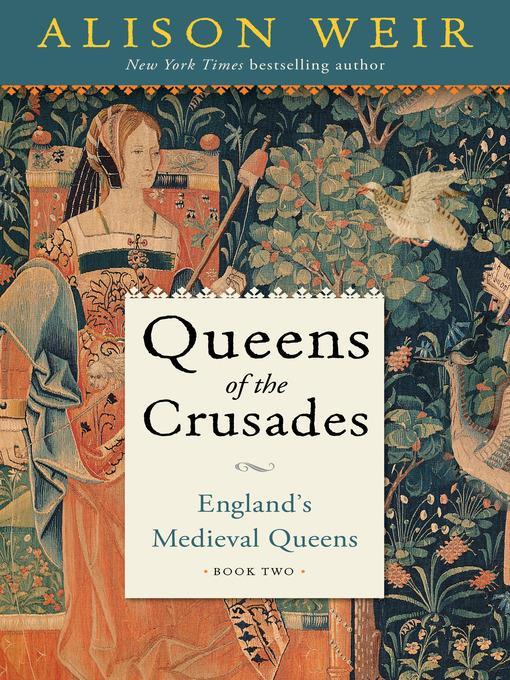
Queens of the Crusades
England's Medieval Queens Book Two
کتاب های مرتبط
- اطلاعات
- نقد و بررسی
- دیدگاه کاربران
نقد و بررسی

October 5, 2020
Novelist and historian Weir follows Queens of the Conquest with this meticulous group biography of the first five Plantagenet queens of England. Moving chronologically, Weir spotlights the historical context in which each queen lived and ruled to create a large-scale, though somewhat dry, record of their era. Citing recent scholarship, she brushes away long-standing legends, including the story of Eleanor of Castile (1241–1290) sucking poison from husband Edward I’s stab wound, and contends that Henry II’s wife, Eleanor of Aquitaine (1122–1204), was not quite the literary patron she’s often made out to be. Due to widowhood, many of these queens’ stories overlap, though Weir shows how Richard the Lionheart’s neglected queen, Berengaria of Navarre (c.1165–1230), largely faded from view because she had no children for whom to advocate after her husband’s death. Notably, Eleanor of Aquitaine, Berengaria, and Eleanor of Castile accompanied their husbands on Crusades; later, Alienor of Provence (c.1222–1291), wife of Henry III, and Eleanor of Castile raised armies to free their husbands from captivity by rebellious English nobles. Weir skillfully documents the political, religious, and cultural issues of medieval England and France, but her wide-angled view keeps each woman from coming fully to life. Readers will miss the vibrancy that characterizes Weir’s other work.

November 1, 2020
The latest massively detailed British royal history/biography from the prolific historian and novelist. In this hefty follow-up to Queens of the Conquest (2017), Weir focuses on the period from 1154 to 1291, offering a meticulous tapestry that will appeal most to students of that and other medieval eras. The author begins with the greatest queen of the period, Eleanor of Aquitaine, the wife of Henry II, a natural ruler and mother of strong future kings who lived into her early 80s, an astounding feat for the time. During her first Crusade, she was a teenager married to young King Louis of France. However, according to Eleanor, she had married a monk, not a king," and the marriage was annulled. A more vigorous political match was made with Henry FitzEmpress, who founded the Angevin royal dynasty. By most accounts, she was his equal and proved to be a major force in bolstering her sons' rebellion against their father. Berengaria of Navarre, wife of Richard I, and Isabella of Angouleme, wife of John, were both kind of ciphers, without much political power of their own--except later in life as widows, and, in Isabella's case, in a second marriage to Hugh X. Alienor of Provence had a successful marriage to Henry III that lasted nearly 37 years while Eleanor of Castile, queen of Edward I, also a devoted and long-suffering wife, has a reputation as the ideal medieval lady. As the author shows, all of these women had to constantly wrestle to gain their rightful dowry and properties from rapacious spouses. Weir effectively interweaves her minutely chronological account into the context of religious wars and cultural currents, such as the courtly Arthurian legends and troubadours. As in previous books, the exceedingly knowledgeable author's prodigious research is impressive, but the narrative isn't consistently entertaining. Another treat for Weir fans but not for readers lacking serious interest in the period.
COPYRIGHT(2020) Kirkus Reviews, ALL RIGHTS RESERVED.

December 15, 2020
The queens of England fascinate historian Weir; she has written numerous historical novels about them and now brews her special blend of scholarship and storytelling in the second volume in a biographical series on the country's medieval queens. It covers the early Plantagenet period (1154-1291) with its quintet of women monarchs: Eleanor of Aquitaine, queen of Henry II; Berengaria of Navarre, queen of Richard I; Isabella of Angoul�me, queen of King John; Eleanor of Provence, queen of Henry III; and Eleanor of Castile, queen of Edward I. Their stories are told in a single continuous narrative, and the result is like a magnificent tapestry, skillfully woven, ingeniously embroidered down to the smallest detail, and gloriously shot through with the glittering intrigues of the royal court. As Weir describes it, she tells ""the story of the history of England through the perspective of its queens."" Aimed at the general reader, this rich and robust account will appeal to readers interested in medieval England and some of its most fascinating royal women, whose stories are often left out of the history books.Women in Focus: The 19th in 2020
COPYRIGHT(2020) Booklist, ALL RIGHTS RESERVED.

January 1, 2021
In the second volume of her series centered on medieval queens of England after Queens of the Conquest, Weir highlights the first five queens of the Plantagenet dynasty: Eleanor of Aquitaine, Berengaria of Navarre, Isabella of Angoul�me, Eleanor of Provence, and Eleanor of Castile. Though only one of them (Eleanor of Aquitaine) participated in a Crusade, the title effectively evokes the turbulent era in which these women lived, when England and France scrapped over territories of the Angevin Empire and English barons established the rights contained in the Magna Carta. Well-practiced in writing for a popular audience, Weir moves briskly and easily through two hundred years of history, though unfortunately documentation for several of her subjects is thin at various points, leaving Weir to fill in gaps with informed supposition or more general information on events during their reigns. As a result, readers might come away with as much or more information about the royal husbands than the queens themselves, though bringing attention to lesser-known figures like Berengaria and Isabella is still laudable. VERDICT Existing fans of Weir's histories will enjoy this newest installment, while those interested in English queens of this time period will find this a suitable if occasionally patchy overview.--Kathleen McCallister, William & Mary Libs., Williamsburg, VA
Copyright 2021 Library Journal, LLC Used with permission.

























دیدگاه کاربران